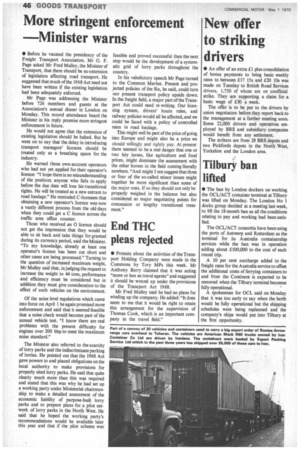More stringent enforcement Minister warns
Page 48

If you've noticed an error in this article please click here to report it so we can fix it.
• Before he vacated the presidency of the Freight Transport Association, Mr G. F. Page asked Mr Fred Mulley, the Minister of Transport, that there should be no extension of legislation affecting road transport. He suggested that much of the 1968 Act need not have been written if the existing legislation had been adequately enforced.
Mr Page was addressing the Minister before 726 members and guests at the Association's annual dinner in London on Monday. This record attendance heard the Minister in his reply promise more stringent enforcement in future.
He would not agree that the extension of existing legislation should be halted. But he went on to say that the delay in introducing transport managers' licences should be treated only as a breathing space for the industry.
He warned those own-account operators who had not yet applied for their operator's licence: "I hope there is no misunderstanding of the position; anyone who fails to apply before the due date will lose his transitional rights. He will be treated as a new entrant to road haulage." He reminded C-licensees that obtaining a new operator's licence was now a vastly different process from the old days when they could get a C licence across the traffic area office counter.
Those who received an 0 licence should not get the impression that they would be able to sit back and take things for granted during its currency period, said the Minister. "To my knowledge, already at least one operator's licence has been cut short and other cases are being processed." Turning to the question of increased maximum weight, Mr Mulley said that, in judging the request to increase the weight to 44 tons, performance and efficiency must be considered but in addition they must give consideration to the effect of such vehicles on the environment.
Of the noise level regulations which came into force on April 1 he again promised more enforcement and said that it seemed feasible that a noise check would become part of the annual vehicle test. "1 know there are real problems with the present difficulty for engines over 200 bhp to meet the maximum noise standard."
The Minister also referred to the scarcity of lorry parks and the indiscriminate parking of lorries. He pointed out that the 1968 Act gave powers to and placed obligations on the local authority to make provisions for properly sited lorry parks. He said that quite clearly much more than this was required and stated that this was why he had set up a working party under Ministerial chairmanship to make a detailed assessment of the economic liability of purpose-built lorry parks and to prepare plans for a pilot network of lorry parks in the North West. He said that he hoped the working party's recommendations would be available later this year and that if the pilot scheme was feasible and proved successful then the next step would be the development of a systematic grid of lorry parks throughout the country.
In his valedictory speech Mr Page turned to the Common Market. Present and projected policies of the Six, he said, could turn our present transport policy upside down. In the freight field, a major part of the Transport Act could need re-writing. Our licensing system, drivers' hours rules, and railway policies would all be affected, and we could be faced with a policy of controlled rates in road haulage.
This might well be part of the price of going into Europe and might also be a price we should willingly and rightly pay. At present there seemed to be a real danger that one or two key issues, like agriculture and food prices, might dominate the assessment with the other horses in the field coming literally nowhere. "And might I not suggest that three or four of the so-called minor issues might together be more significant than some of the major ones. If so they should not only be properly weighed in the balance but also considered as major negotiating points for concession or lengthy transitional treatment."
















































































































































































































